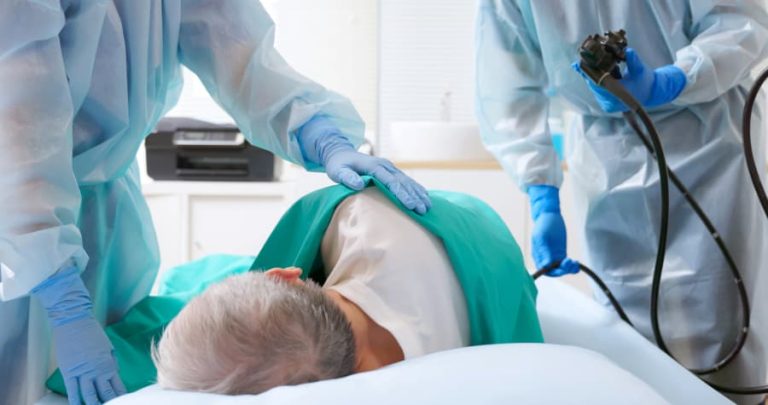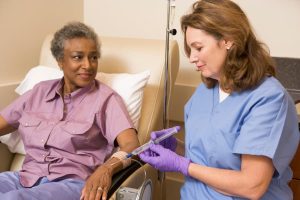
Signs of Precancerous Colon Conditions
Adenomatous polyps are a precancerous condition. They are not cancerous by themselves and are often largely harmless. Their presence, however, indicates abnormal changes to colon
HIPAA Alert: Potential Data Breach Learn More
Questions on Oncology, Hematology and/or Infusion Clinical Services due to COVID-19 Crisis – CALL 833-698-1623
Important Information for Our Patients Regarding the Coronavirus.
RCCA Providing Area Cancer Patients with Access to Care During Coronavirus Outbreak
RCCA Offering Patients Virtual Visits During Coronavirus Pandemic
A colonoscopy plays a crucial role in colon cancer detection. This test, which involves examining the colon’s inner lining with a specialized camera, is used for routine screening, diagnosis, biopsies, and more, to enable an informed treatment response.
If a colonoscopy finds cancer, the patient should begin treatment as soon as possible. Many people diagnosed with colon cancer turn to Regional Cancer Care Associates (RCCA) for treatment. RCCA is a group of more than 100 medical oncologists and hematologists who treat patients who have solid tumors, blood-based cancers and benign blood disorders at more than 20 locations throughout New Jersey, Connecticut, Massachusetts, and the Washington, DC area.
With an emphasis on targeted therapies, RCCA helps patients achieve the best possible outcomes from treatment.
A colonoscopy is the primary means of detecting colon cancer. The test involves inserting a colonoscope, or a specialized camera, into the rectum. The camera is used to examine the whole inside of the rectum and colon. It may also be used to remove tissue samples for a biopsy. Though often uncomfortable, colonoscopies are an important part of cancer detection and diagnosis.
Colonoscopies are requested for a variety of reasons. Getting a colonoscopy does not necessarily mean that the individual has cancer. It may be done for screening purposes or to diagnose other medical conditions. Reasons to get a colonoscopy include:
The most common reason for colonoscopies is for colon cancer screening. Routine tests are a way for oncologists to look for polyps, tumors, or other signs of cancer, potentially detecting cancer before it starts showing symptoms. Early detection gives patients and oncologists a head start on treatment, leading to better prognoses and a higher likelihood of full recovery.
The American Cancer Society (ACS) recommends that people at average risk of colon cancer receive a colonoscopy every 10 years after the age of 45. Individuals may start screenings earlier, or screen more frequently, if they are at higher-than-average risk of cancer. Risk factors for colon cancer include:
If someone is subject to one or more risk factors, they should speak with their physician about what starting age and screening schedule is appropriate for them.
Colonoscopies are also recommended for diagnostic purposes. If an individual is experiencing signs or symptoms that may be related to colon cancer, a colonoscopy may be used to determine the cause. Symptoms of colon cancer include:
It is important to note that the great majority of individuals who experience one or more of the symptoms listed above will not have colon cancer. Nonetheless, it is important to consult a physician about these symptoms, particularly if they are pronounced, arose suddenly, or have persisted for an extended period.
Colonoscopies can be used to diagnose cancer in addition to other conditions, such as inflammatory bowel disease (IBD) or irritable bowel syndrome (IBS). In every case, an accurate diagnosis is key to planning effective treatment.
Finally, colonoscopies are used to remove abnormal tissue or polyps. Polyps are pre-cancerous growths that form inside the colon. Though they are not malignant, some types of polyps have a high likelihood of becoming cancerous. Removing them is therefore crucial to preventing cancer. If a polyp, tumor, or other suspicious tissue growth is found on a CT colonography or other imaging test, then a colonoscopy will be arranged to remove the abnormal tissue.
After a polyp or suspicious growth is removed, it may be biopsied. A biopsy is a diagnostic test that involves examining tissue samples under a microscope. It can be used to determine whether the abnormal tissue is cancerous. If cancer cells are found, then the patient and their care team can begin discussing the first steps for treatment.
Before a colonoscopy, individuals must perform a bowel cleanse. This process is used to clear out the colon and ensure that the colonoscope has a clear view of its inner lining. The physician will provide instructions for completing the bowel cleanse correctly. In most cases, patients must avoid fibrous foods for several days before testing. They must then follow a clear-liquid diet for one to two days before testing. A clear liquid diet includes only liquid foods without any solids, pulp, or cream, such as:
The individual will also be prescribed a strong laxative. This and the clear-liquid diet may cause frequent and intense diarrhea, so people should make sure they have easy access to a bathroom. They should also contact their doctor if there are any concerns about an inability to finish the cleanse.

When the individual arrives at the hospital for a colonoscopy, they will put on a hospital gown. They will then lie down on a procedure table. Sedation or anesthesia may be provided to keep the individual relaxed or asleep during the procedure, which follows these steps:
The procedure typically takes about one hour to complete. Afterward, the individual is taken to a recovery room until the sedative or anesthesia wears off. The individual is free to go home as soon as they are alert.
People should plan for their colonoscopy recovery. A ride home is often necessary, as it is unsafe to drive before the anesthesia or sedative fully wears off. He or she may also want the day off from work. Many people feel tired after a colonoscopy and need time to recuperate. Bloating, gas, and cramping are other common side effects. Otherwise, they can return to their normal activities as soon as they feel sufficiently rested.
Colonoscopy results may take up to a week to process. Once they are ready, the physician will get in touch to discuss. A follow-up appointment may be necessary if testing identified anything suspicious or if biopsies came back positive for cancer.
If colonoscopy results are positive, it is important to find access to high-quality care. Regional Cancer Care Associates offers cutting-edge colon cancer treatment with an emphasis on the latest innovations. RCCA specialists provide care to more than 30,000 new patients and 265,000 established patients each year. RCCA physicians offer patients innovative therapies, including immunotherapies and targeted therapy, cutting-edge diagnostics as well as access to approximately 300 clinical trials in community-based centers close to home.
What is a colonoscopy procedure?
A colonoscopy is an invasive diagnostic test used to examine the inside of the colon. It is used to diagnose a wide variety of colon conditions, including cancer.
When should colon cancer screening begin?
The American Cancer Society (ACS) recommends that people at average risk of colon cancer begin routine screenings at age 45. People at above-average risk should consider starting earlier.
How often should I receive a screening colonoscopy?
People age 45 and older should receive a screening colonoscopy every 10 years. If someone is at above-average risk of colon cancer, or if previous tests have shown suspicious results, they may need to screen more often.
What are the symptoms of colon cancer?
Colon cancer does not always cause symptoms in the early stages. When symptoms develop, they can include:
The great majority of women and men who experience one or more of the symptoms listed above will not have colon cancer. Nonetheless, it is important to consult a physician about these symptoms.
What are the risks of a colonoscopy?
Colonoscopies have a very small risk of infection, especially if polyps were removed. Patients should watch for fever or chills, heavy bleeding, nausea, vomiting, or severe bloating that does not go away.
From the moment you have you first appointment at one of RCCA’s 25+ locations, you’ll experience quality care that only our highly trained oncologists can provide. We’ll take the time to help you understand your diagnosis and your options, so you and your doctor can devise the best treatment plan for your unique situation. You’ll also have access to clinical trials, putting you at the forefront of innovations in the field of colon cancer care.
To learn more about colon cancer treatment at RCCA or to schedule an appointment, reach out to us at 844-346-7222.

Adenomatous polyps are a precancerous condition. They are not cancerous by themselves and are often largely harmless. Their presence, however, indicates abnormal changes to colon

Colon cancer is among the most common cancer types diagnosed in the United States. According to colon cancer projections from the American Cancer Society, about

If you or a loved one has been diagnosed with colon cancer, identifying the treatment approach that’s best for you and your particular circumstances is
When standard cancer treatments aren’t providing the results you want, clinical trials may offer hope. Our physicians use clinical trials to study new treatments, helping transform cancer care for the better. You can enroll in a clinical trial to try groundbreaking treatment plans at zero cost to you.

Regional Cancer Care Associates is one of fewer than 200 medical practices in the country selected to participate in the Oncology Care Model (OCM); a recent Medicare initiative aimed at improving care coordination and access to and quality of care for Medicare beneficiaries undergoing chemotherapy treatment.